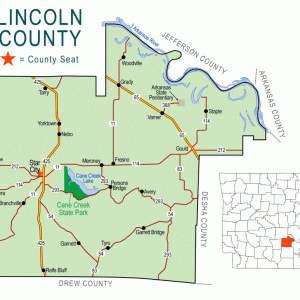calsfoundation@cals.org
Yorktown (Lincoln County)
Yorktown is an unincorporated community in Lincoln County. Located on U.S. Highway 425 about six miles north of Star City (Lincoln County), the small community is also a landmark on the meandering course of Bayou Bartholomew.
Although the land where Yorktown developed was claimed by the Quapaw at the time the Arkansas Territory was organized, it was sparsely populated. Even after Arkansas became a state, the region remained unclaimed for some time, in part because steamships rarely were able to navigate Bayou Bartholomew as far north as the Yorktown area (which at the time was part of Jefferson County). The settlement was named for the York family, who arrived shortly before the Civil War began; Joseph Lane Hunter, another settler, first claimed land in the area in 1858, clearing land for cotton and planning to build a gin. Hunter served in the Confederate army for the four years of the war, and then he returned to farming. In 1884, he built a new house on the ridge that overlooks the bayou and established an orchard that survived more than 100 years. Oak Grove Baptist Church was organized in Yorktown in 1861, although the congregation did not erect a church building until 1872. Most of the members of the congregation had either died or left the area by 1885, and the church closed.
About a dozen more families moved into the area in the mid-nineteenth century. A bridge crossing the bayou was built in 1872. More families moved into the area late in the century, and a school was built in the 1890s. African-American families established Mount Nebo Church near Yorktown in 1879, and a school for Black children was built near the church. A post office opened in Yorktown in 1881; it operated for forty years before closing in 1921.
Two sawmills were operating in Yorktown around the beginning of the twentieth century. The community had a cotton gin, a grist mill, stores, and blacksmith shops. There were also two physicians. A new schoolhouse for the white children of the area was built in 1911. Roads were improved in the area, and the bridge over the bayou was replaced with a steel structure in 1916.
Local sources state that a Black man was lynched in Yorktown in 1921 after he supposedly complimented a white woman on her appearance. A race riot nearly erupted to accompany the lynching, but Black residents hid from their white neighbors until tempers had calmed.
Evangelist J. D. Sayers led a tent revival on the school grounds in 1924, resulting in the establishment of Yorktown First Baptist Church. The congregation met in the school for ten years until a building was finished in 1934. Meanwhile, a Freewill Baptist congregation was formed in 1933.
The post office was reestablished in Yorktown in 1943 after a post office was closed in nearby Phenix (Lincoln County). In 1945, Yorktown’s school closed when the school district was consolidated into that of Grady (Lincoln County). In 1983, Yorktown was described in a history of Lincoln County as a farming community with primary crops of soybeans, cotton, corn, and rice. There were two stores, a cotton gin, a post office, and five churches (all Baptist). By 2010, most businesses in Yorktown had closed, with only the post office and a barbecue restaurant remaining.
For additional information:
DeArmond-Huskey, Rebecca. Bartholomew’s Song: A Bayou History. Bowie, MD: Heritage Books, 2001.
Lincoln County Historical Committee. History of Lincoln County, Arkansas, 1871–1983. Dallas, TX: Taylor Publishing Company, 1983.
Steven Teske
Butler Center for Arkansas Studies
 Lincoln County Map
Lincoln County Map 



Comments
No comments on this entry yet.